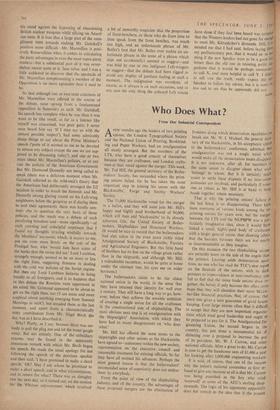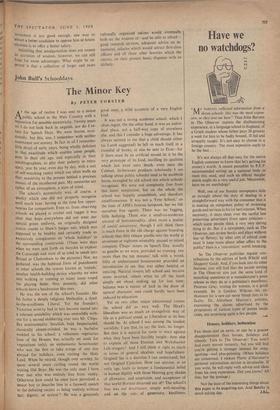Who Does What?
From Our Industrial Correspondent AFEW months ago the leaders of two printing unions, the London Typographical Society and the National Union of Printing, Bookbind- ing and Paper Workers, had an amalgamation all nicely arranged. But the members of the LTS, who have a good conceit of themselves because they are craftsmen, and London crafts- men at that, voted against the merger. This week, Mr. Ted Hill, the general secretary of the Boiler- makers' Society, has succeeded where the print- ing unions failed, for he has taken the most important step in joining his union with the Blacksmiths', Forge and Smithy Workers' Society.
The '11,000 blacksmiths voted for the merger in a ballot, and they will soon join Mr. Hill's happy and highly paid brotherhood of 94,000, which will then add 'blacksmiths' to its already sonorous title, the United Society of Boiler- makers, Shipbuilders and Structural Workers. (It would be nice to record that the boilermakers had also taken in the even more richly titled Amalgamated Society of Blacksmiths, Farriers and Agricultural Engineers. But this little band of brothers has its feet on the village green rather than in the shipyards, and although Mr. Hill, a redoubtable raconteur, would be quite at home under the chestnut tree, his eyes are on wider horizons.) The boilermakers claim to be the oldest national union in the world, in the sense that they have retained their identity for well over a century. They still have a long way to go, how- ever, before they achieve the sensible ambition of creating a single union for all the craftsmen in the constructional side of shipbuilding. The most obvious next step is an amalgamation with the •Shipwrights' Association, with which they have had so many disagreement on 'who does what.
Mr. Hill has offered the same terms to the shipwrights and other unions as the blacksmiths have agreed to—autonomy within the new society, representation on the executive council and reasonable treatment for existing officials. So far they have all resisted his advances. Perhaps the most general reason is that the boilermakers' unconcealed sense of superiority does not endear them to everybody.
From the point of view of the shipbuilding industry and of the country, the advantages of these proposed mergers are the elimination of frontiers along e hich demarcation squabbles C3 break out. Mr. W. J. Michael, the general seat' tary of the blacksmiths, in his acceptance speed to the boilermakers' conference, admitted that amalgamation was not a magic wand ‘k hich would make all the demarcation issues disappear. It is not unknown. after all, for members of the same union to disagree about what v% ork 'belongs' to whom. But it is certainly much easier to settle these disputes if no inter-union jealousies are involved, and particularly if some" one as robust as Mr. Hill is at hand to hang heads together where necessary. That is why the printing unions' failure At the last fence is so disappointing. There haYe been overtures of various kinds among the tell printing unions for years now, but the merger between the LTS and the NUPBPW was a Par' ticularly imaginative idea, since it would have linked a small, highly-paid body of craftsmen with a larger general union, thus showing others that the barriers between them are not nearlY as insurmountable as they imagine.
On this occasion the two shipbuilding unions are certainly more on the side of the angels than the printers. Leaving aside demarcation ques- tions, no one who has read the TUC's new report on the finances of the unions, with its dark pointers to improvidence or near-insolvency, can fail to feel that the more trade unions draw to- gether, the better, if only because this offers some hope that they will abandon their more Micaw- ber-like financial practices. Not, of course, that mere size gives a sure guarantee of good house,- keeping. Even large unions often find it difficult to accept that they are now important organisa- tions which need good leadership and ought 10 be prepared to pay.for it. The Amalgamated En- gineering Union, the second largest in the country, has just done a monumental bit of dithering over a proposal to increase the paY of its president, Mr. W. J. Carron, and other national officials. After a great to-do, Mr. Carron is now to get the handsome sum of £1,400 a year for looking after 1,000,000 engineering workers. It is said, of course, that one of the reasons why the union's national committee at first re- fused to give any increase at all is that Mr. Carroll was being punished as the boy who cried 'werewolf' at some of the AEU's sterling shoP- stewards. The logic of his opponents apparently does not stretch to the idea that if the present incumbent Is not good enough, one way to attract a better candidate to oppose him at future elections is to offer a better salary. Admitting that amalgamation does not ensure an accretion of wisdom, however, we can still hope for some advantages. What might be ex- pected is that a collection of larger and more rationally organised unions would eventually both see the wisdom of—and be able to afford— good research services, adequate advice on in- vestment, salaries which would attract first-class officers and all those other luxuries which the unions, on their present basis, dispense with so blithely.



































 Previous page
Previous page